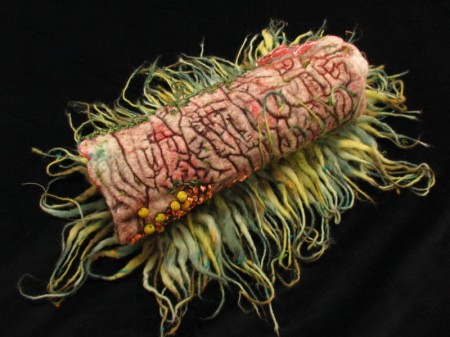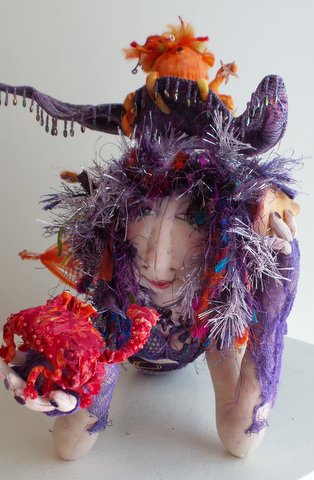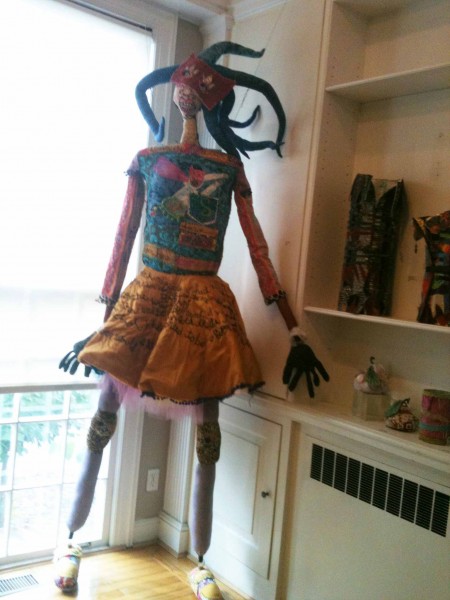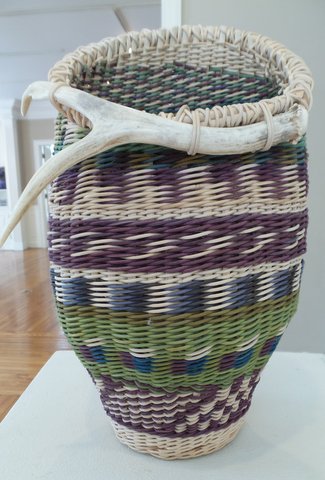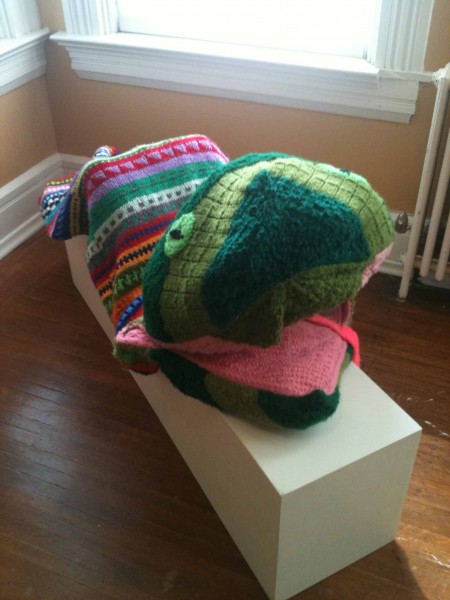I had high hopes for “Fiber: The Next Dimension” at the Kennedy Heights Arts Center. The photograph of Amy Wallace’s Nature’s Vessel that accompanied the press release bolstered those hopes.
I’d also seen guest curator, Carole Gary Staples’ 2013 “Vessels: All the Eyes Can Hold” at Kennedy Heights, and liked it a lot (see aeqai.com, September 2013). However, I had not seen the “award-winning textile artist from West Chester Township(’s)” 2011 “Fibers: A Celebration of Cincinnati’s Fiber Artists”; that might have given me a better idea of what to expect in this year’s fiber exhibition of 62 works by 26 artists, culled from an open call asking for pieces that incorporated fiber, cloth, paper, natural materials, etc., coupled with at least two other materials. If the show’s title hadn’t been so ambitious, I might not have been so disappointed with the results since the pieces might have looked more at home in a barn at the county fair, instead of Kennedy Heights’ commodious gallery space.
Even if the venue had not been quite so refined, the exhibition would still have been disappointing since there seemed to be nothing that really expanded my notion of fiber as a category; the “next dimension” remained unexplored.
Nothing was particularly innovative, and the artists, even if competent, didn’t project distinctive aesthetic personalities. This is apparent in the sameness of the stuffed-and-embellished dolls by Holly Adler, Pam Kravetz, Elizabeth Marten, Kim Pickard, and Robbie Porter that populated the galleries. I’m pretty sure the artists will take exception to this, but I am hard-pressed to come up with what distinguishes each of them, whether in terms of material, technique, or style. All of the dolls are stuffed, the features on their faces are picked out by stitching and paint, and most are attired in elaborate and joyous costumes.
Of course, these dolls are all handmade, but there are plenty of similar dolls on the commercial market. There are the life-size stuffed “butlers-with-serving-tray” mannequins, which make a wry statement overseeing a home bar. 347
The artists’ similarities are easily seen in the five fanciful and charming dolls by Adler, Marten, and Pickard that were arrayed on the fireplace mantle. Pickard’s mermaid Lucielle, While I Have You on the Phone, which is a boiled crab, is delicious. Her exaggeratedly long tail, covered in a purple net suggesting scales, does a graceful loop-de-loop while a goldfish, suspended in air, floats by. Beneath a wild head of hair, her expression is dreamy, like that of one half-listening to a phone conversation. Adler’s Martinique, which I imagined to be a voodoo priestess, has a remarkably similar visage. Dominick, one of the three dolls by Marten, pirouettes on tiny ballet-slippered feet and wears a garment that is fashioned from a kaleidoscope of patterned fabrics.
Although I liked their flash, I preferred Marten’s Woodland, which is more subdued with its quiet palette of truffle and beige. There is a sense of wonder in the wide-eyed expression on her elfin creature’s face. He bends to pick up a basket filled with the forest’s bounty of pinecones, acorns, thistles, etc., with his gargantuan hands. 553
I’d love to see Marten’s Woodland sprite next to Wallace’s Nature’s Vessel, an open-ended cylinder inspired by a decaying hollow log that, according to Wallace, “serves as an abundant source of nourishment for many organisms: a literal and symbolic setting for all cycles of life.” It’s made of felt and adorned with tiny jade-colored beads and rests on a mossy bed of loosely twisted yarn. She’s used techniques that she enjoys without allowing them to overwhelm her message.
Chris Baumgardner’s twist on the utilitarian pincushion is also intellectually engaging. Instead of the garden-variety tomato-shaped pincushions found in every sewing box, the artist has chosen a pear for the two precious Pear Pin Cushions (sic). Decorated with all manner of traditional sewing techniques — appliqués, beading, embroidery, crochet, buttons, etc. — the Pin Cushions (sic) are unpretentious yet amazingly thought provoking as they riff on the textile arts heritage. 703
“Big is better” is a mantra that some artists, particularly craft artists or “artists who work with craft materials” – take your pick — must certainly intone as they create their works. The self-described “tutu wearin‘” Kravetz’s, also tutu-wearin‘, Super Hero has the same aesthetic as the other doll makers, but she’s appropriately bumped up the size so her figure towered over me, reminding me of Viola Frey’s monumental clay figures. Kravetz’s super heroine, or perhaps cross-dressing hero, stands her ground, ready to take on all comers.
I have an affinity for craft materials and techniques and particularly love basketry – both the traditional and the more avant-garde sculptural expressions. But Terri Wright’s baskets just didn’t do it for me. She hasn’t pushed her material enough. The baskets are neither particularly beautiful nor virtuosic renditions of the traditional, and their forms are far from intriguing. 847
A knitter myself, albeit lapsed, I was tickled by Sara Deever’s Giant Toy Snake hand-knit in brilliantly colored yarn. She made it to satisfy her seven- and nine-year-old grandchildren who wanted a snake that “could really swallow them,” and this one does. Deever’s serpent doubles as a sleeping bag, and at craft fairs, the kids sometimes crawl in and wiggle “to entice unwary patrons.” Even without them, I can imagine it slithering across the gallery floor late at night.
I understand that in juried exhibitions you have to deal with what you’ve got, but Staples seems satisfied that “the local artists who responded to our call have really stretched their imaginations.” I fear not far enough.
–Karen S. Chambers
“Fiber: The Next Dimension,” Kennedy Heights Arts Center, 6546 Montgomery Rd., Cincinnati, OH 45213, 513-631-4278, fax: 513-631-1723, www.kennedyarts.org. Closes September 26, 2015.

